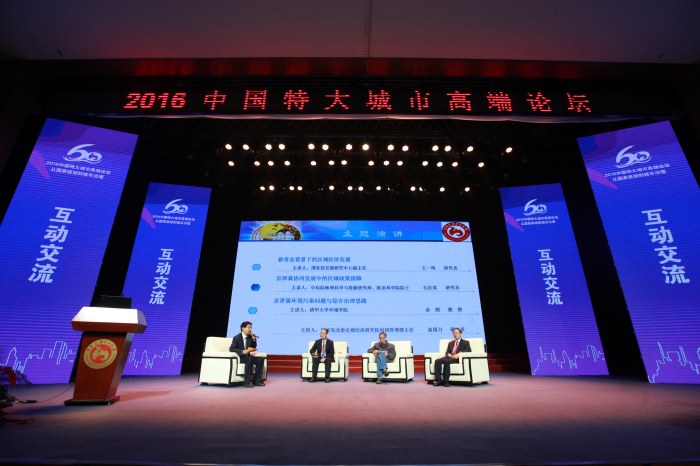CUEB Holds the 2016 China Mega-City Summit:From National Planning to Urban Governance

Wang Yiming, the researcher and Deputy Director of the Development Research Center of the State Council, profoundly expounded some major problems and their cracking mechanisms of the regional economic development in a “new normal”. He expressed that urban agglomeration as an important carrier of industrialization, a platform of marketization and a stage of internationalization would play a great role in promoting regional cooperative development.
Mao Hanying, an academician of the International Eurasian Academy of Sciences and researcher of the Institute of Geographic Sciences and Natural Resources Research, Chinese Academy of Sciences, from the perspective of regional policy, raised the key issues of ecological compensation, poverty alleviation and development, and functional positioning in the coordinated development of Beijing, Tianjin and Hebei. Therefore, the macro-regional policies of orderly ease of industry, undertaking industrial transfer, differentiated innovation-driven and comprehensive and standardized regional ecological compensation should be formulated.
Yu Gang, Professor of Tsinghua University School of Environment, particularly analyzed the specific problems and the comprehensive management ideas in connection with the environmental pollution of Beijing, Tianjin, and Hebei. He also introduced a major national scientific and technological project related to the comprehensive environmental management of Beijing, Tianjin, and Hebei was to be launched.
In the Q&A session, the speakers answered the questions from the host and the audiences. The atmosphere was very active.
In the second half of the forum, the guests respectively delivered keynote speeches on “Historical Experience and Lessons of Construction of Megacity Satellite Town”, “National Space Governance and Spatial Planning System”, “Sponge City and Ecological Restoration Theory and Practice” and “Ten Major Relations of Urban Development in Beijing”.
Professor Qiu Baoxing, the Counselor of the State Council and former Deputy Minister of the Ministry of Housing and Urban-Rural Development, introduced the experiences and lessons of the past three generations of the new city model in recent 100 years, the role of satellite towns in the evacuation of megacities, the conditions and the enlightenment for organic mitigation of Chinese metropolis.
Professor Zhang Bing, the Chief Planner of the China Academy of Urban Planning and Design, elaborated on the significant theory, evolution and practice of the national governance and spatial planning system. He proposed that China’s spatial planning reform should follow the science to promote national spatial planning in a more favorable and effective direction, so as to solve the problem of new urbanization, rather than to simply create more types of planning.
Professor Yu Kongjian, Dean of the College of Architecture and Landscape Architecture of Peking University, showed his unique ideas and measures for the macroscopic planning and management of the urban ecological environment, believing that we should establish ecological infrastructure from the national, regional and urban scale to promote urban construction with water ecological infrastructure as the direction.
Professor Wen Kui, the former CUEB President and chief expert of the Institute of Metropolis, analyzed the ten major relations of urban development in Beijing and the reflections on practice on this basis. The ten relations are the capital city and the imperial city, the capital function and the city function, the core function and the economic function, the capital economy and the capital economic circle, the plan establishment and the plan implementation, the urban renewal and the plan control and so on.
Experts and scholars from Tsinghua University, Peking University, Renmin University of China, Beijing Normal University, Northeastern University, Chinese Academy of Social Sciences, Chinese Academy of Sciences and other universities and scientific research institutions, the guests from the State Council Development Center, the State Ministry of Housing and Urban Development, the Academy of Macroeconomic Research of the National Development and Reform Commission, the Beijing Municipal Committee of the General Office of the Information Room, the Beijing Municipal Committee of the Chinese People's Political Consultative Conference, the Beijing Urban Management Law Enforcement Bureau and other government institutions as well as more than 400 students and teachers attended this forum.
